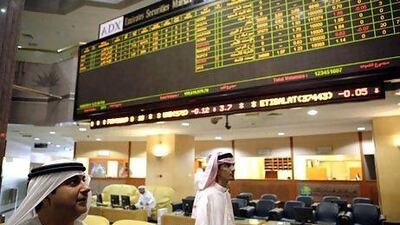The nation's stock markets have already priced in an MSCI upgrade to "emerging markets" status for the UAE, even as analysts say the decision expected imminently is too close to call.
The US compiler of influential investment indexes will announce at 1am local time if the Emirates should have "emerging" rather than "frontier" market status. In its review last June, MSCI listed several improvements the UAE needed to make to merit the new classification. Analysts say minor changes have been made since then.
"All the reasons and excuses MSCI had for not upgrading the country are still there," said Zin Bekkali, the chief executive of Silk Invest, an emerging and frontier markets fund company based in London.
UAE bourses have climbed in recent weeks, in part because of speculation over MSCI's decision, with Dubai shares rising 16 per cent in value since the end of March and the Abu Dhabi measure adding 10 per cent over the same period.
One of the criteria MSCI identified was increased foreign ownership in listed companies. But last week, a senior Ministry of Economy official said there were no plans to raise the ownership limit. Foreign ownership is capped at 49 per cent of listed firms but some major companies, such as the leading telecommunications operator Etisalat, only allow UAE nationals to own their shares .
Just 3.3 per cent of UAE stocks are held by foreign investors, according to a research note from Al Ramz Securities last month.
MSCI also required local bourses to implement a new settlement system, called delivery-versus payment (DvP), in which payment is made the same day securities are delivered. The Abu Dhabi Securities Exchange and Dubai Financial Market have said in recent months the necessary procedures were in place, but brokerages have struggled to implement the system successfully. Nasdaq Dubai postponed implementation until next month.
MSCI, which will announce its decision on whether to raise Qatar to emerging market status at the same as it reveals its UAE decision, establishes indexes that help guide the investment decisions of international fund managers.
Because emerging markets are considered better regulated and more liquid than frontier markets, they attract more outside investment.
Industry experts and analysts have estimated the UAE could attract anywhere from a few hundred million dollars to US$1.5 billion (Dh5.51bn) in fresh investment if the Emirates is awarded the upgrade. However, analysts said the effect would not be immediate because fund managers have up to a year to adjust their allocations.
"The impact is not going to be massive but it will certainly raise the standards" of local markets if they are upgraded, said Fathi ben Grira, the chief executive at Mena Corp brokerage, which estimates $1.5bn of new investment will come into the UAE if it becomes an emerging market.
Mr Bekkali agreed an upgrading would be positive but cautioned it would not be the silver bullet some retail investors were hoping for. "It would be good to engage with index providers to appeal to international investors, but that won't solve the deeper issue of illiquid markets," he said.
Given the lack of some major changes in categories cited as required by MSCI last year, several market-watchers said they were wary of the UAE's chances. "I won't be staying up for it, to be honest," said an executive at an international bank, who was sceptical of a positive result.
If the UAE gets the promotion, it will have a weighting of about 0.3 per cent on MSCI's emerging market index. That compares to 16.4 per cent for Brazil and 17.4 per cent for China.
Morocco and Egypt are the only markets in the Middle East classified as emerging, but their weighting on the MSCI's index is also less than 1 per cent.
Yesterday, the UAE markets lost some of their recent gains as Dubai fell to its lowest point in two weeks, down 1.7 per cent. Abu Dhabi's market closed down 0.7 per cent.

